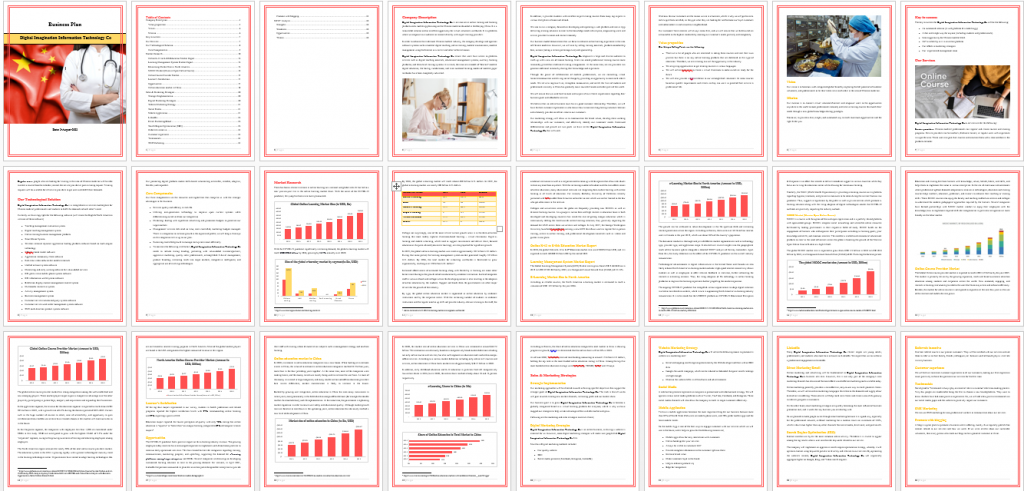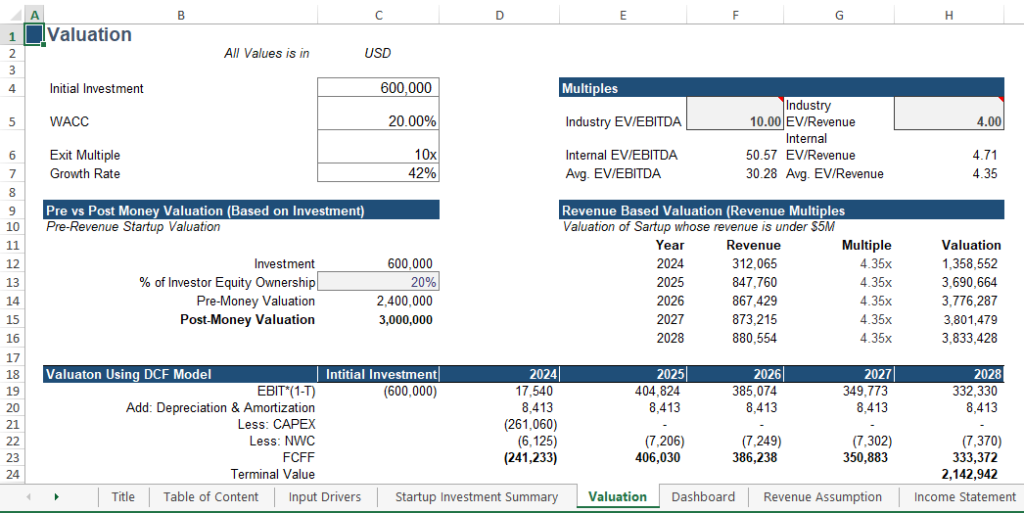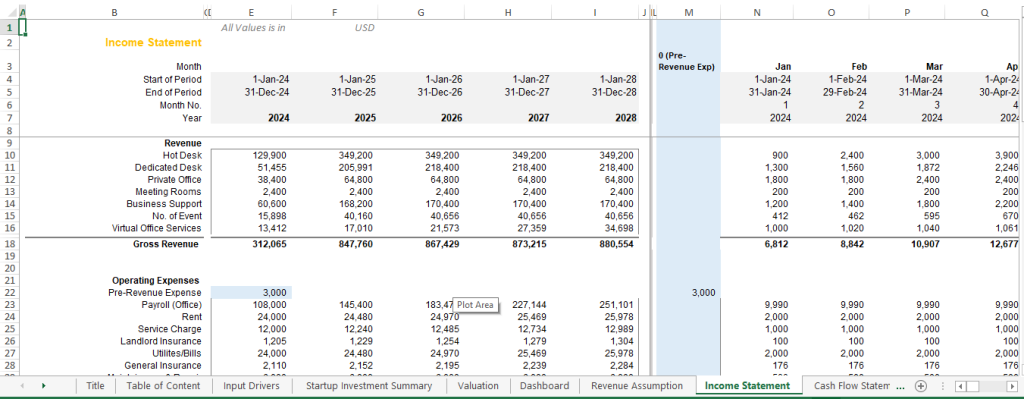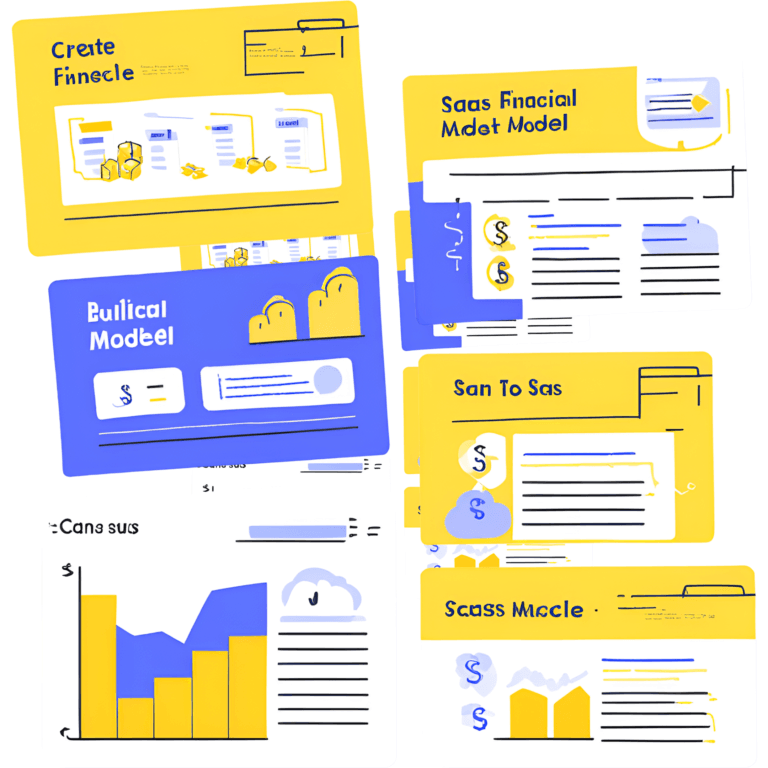In today’s evolving work landscape, the concept of coworking spaces has gained significant traction, catering to the needs of freelancers, startups, remote workers, and small businesses. As traditional office environments become less appealing, the demand for flexible, collaborative, and dynamic workspaces continues to rise. However, launching a successful coworking space requires more than just a great location and aesthetic appeal. It demands a comprehensive business plan that not only outlines your vision but also details the strategic steps needed to achieve your goals.
Although, it is best to hire business plan consultant, who are expert and develop a detailed and industry’s standard, but, if you want to develop your own, This article is all in one.
This article will walk you through each critical component of a coworking business plan, coworking financial planning, offering insights and practical advice to help you create a compelling and effective document. By the end of this article, you’ll be equipped with the knowledge to develop a business plan that can attract investors, guide your decision-making, and set your coworking space on a path to long-term success.
What is a coworking business plan?
A coworking business plan is a detailed document that outlines the strategy for launching and managing a coworking space. It includes market analysis, financial projections, marketing strategies, and operational details. The plan’s primary purpose is to provide clear direction, secure funding by demonstrating the business’s viability, and highlight what sets it apart from competitors. Additionally, it serves as a management tool, guiding both daily operations and long-term decisions to ensure the coworking space’s success and growth.
Benefits of a well-crafted coworking business plan
A well-crafted coworking business plan is a powerful tool that provides a solid foundation for your business. It not only outlines your vision and strategy but also ensures that every aspect of the business is thoughtfully planned and executed. Here are the detailed benefits of creating a comprehensive coworking business plan, along with examples to illustrate each point:
1. Secures Funding
Benefit: A detailed business plan demonstrates the viability and profitability of your coworking space to potential investors and lenders. It includes financial Forecasting model, revenue models, and funding requirements, making it easier to secure the necessary capital to start and grow your business.
Example: Imagine you are pitching your coworking space Startups to a group of investors. Your business plan includes detailed financial forecasts showing projected revenues and expenses, break-even analysis, and anticipated profits. This information convinces investors of the potential return on their investment, leading them to fund your venture.
2. Clarifies Vision and Goals
Benefit: A business plan helps you clearly articulate your business vision, mission, and goals. It defines your unique value proposition and sets specific, measurable objectives, ensuring everyone involved understands the direction of the business.
Example: In your business plan, you outline that you aims to provide a vibrant and innovative workspace for freelancers and startups in downtown. Your mission is to foster creativity and productivity through community events, workshops, and networking opportunities. This clear vision guides all your business decisions and initiatives.
3. Guides Operations
Benefit: The plan provides a structured approach to daily operations and long-term strategic decisions. It details operational procedures, management roles, and workflows, ensuring smooth and efficient business management.
Example: Your plan includes an operational blueprint, specifying how the space will be managed daily. It covers membership management, booking systems for meeting rooms, maintenance schedules, and roles and responsibilities of staff members. This structure ensures that operations run smoothly and efficiently.
4. Identifies Risks
Benefit: A comprehensive business plan helps you identify potential risks and challenges your coworking space might face. It allows you to develop contingency plans to mitigate these risks, reducing the likelihood of unexpected setbacks.
Example: Your market analysis identifies a risk of high competition in the downtown area. To mitigate this, your business plan includes strategies such as offering unique amenities (like a podcast studio or wellness programs) and creating strategic partnerships with local businesses to enhance member benefits.
5. Tracks Progress
Benefit: The plan establishes benchmarks and metrics for measuring success. It helps you track progress against your goals and make informed adjustments as needed to stay on course.
Example: Co working business plan sets quarterly targets for membership growth, event attendance, and revenue. Regularly reviewing these metrics helps you understand what’s working and where adjustments are needed, ensuring continuous improvement and growth.
6. Competitive Advantage
Benefit: A well-crafted business plan highlights what sets your coworking space apart from competitors. It identifies your unique selling points and how you will attract and retain members.
Example: Your business plan emphasizes that It offers a unique blend of flexible workspace options, community-driven events, and professional development workshops. These features distinguish your coworking space from others in the area, making it more attractive to potential members.
7. Enhances Decision-Making
Benefit: The plan provides a clear framework for making informed business decisions. It helps prioritize initiatives based on strategic goals and available resources, ensuring effective allocation of time and money.
Example: When deciding whether to expand to a second location, you refer to your business plan. The detailed market analysis and financial projections help you assess whether the expansion aligns with your strategic goals and is financially viable.
8. Improves Communication
Benefit: A detailed business plan facilitates better communication with stakeholders, including employees, investors, and partners. It clearly outlines your business strategy and objectives, ensuring everyone is aligned and working towards the same goals.
Example: Sharing your business plan with potential partners, helps them understand your vision and the mutual benefits of collaboration. This clarity fosters strong, productive partnerships that support your business’s growth.
What are the components of a business plan for a coworking space business?
Now that you understand the importance of having a strong business plan in place, let’s take a look at the components that make up the best coworking business plans.
Here are the critical components of a comprehensive business plan for a coworking space business:
1. Description: Start with a Clear Thought, Motivation & Vision
Before diving into the specifics, take the time to articulate your vision for the coworking space. What inspired you to start this venture? What values will guide your business? Define your mission statement and core objectives to set the foundation for your business plan.
2. Define Your Unique Value Proposition
What sets your coworking space apart from others in the market? Whether it’s a prime location, innovative amenities, or a vibrant community atmosphere, clearly define your unique value proposition and how it addresses the needs of your target audience.
3. Outline Your Services and Amenities
Detail the range of services and amenities your coworking space will offer. From flexible workspace options and state-of-the-art facilities to networking events and professional development workshops, articulate how each offering contributes to the overall member experience.
4. Research Your Market
Conducting a thorough market analysis is a crucial step in developing your coworking business strategy, regardless of whether you’re creating a formal business plan. This analysis will provide insights into the local market as well as the broader coworking sector.
Key aspects to cover in your market analysis include the market’s growth trajectory, prevailing trends, and your target customer demographics, along with the rationale behind your target audience selection.
For instance, your analysis might reveal that remote workers comprise 20% of coworking space occupants, with this figure expected to rise. Consequently, you may decide to tailor your coworking space offerings specifically towards remote workers in your locality.
Another important consideration for this section, and indeed for your entire business plan, is to substantiate all findings with credible sources. Ensure that you can provide verifiable sources for any data or statistics cited, reinforcing the credibility of your analysis and strengthening your business plan overall.
5. Coworking Marketing Strategy
Craft a comprehensive marketing strategy to attract and retain members. Identify your target market, define your brand positioning, and outline your tactics for reaching potential members through channels such as social media, email marketing, and community partnerships.
6. Coworking space Financial Projections
Develop detailed Coworking financial Model & Valuation to demonstrate the financial viability of your coworking space. Estimate your revenue streams, expenses, and funding requirements, and create income statements, cash flow projections, and balance sheets to support your financial forecast.
7. Operational Plans
Outline the day-to-day operations of your coworking space, including facility management, technology infrastructure, member services, and key policies and procedures. Establish clear processes to ensure smooth operations and exceptional member experiences.
8. Foster Community Engagement
Building a strong and vibrant community is essential for the success of your coworking space. Plan regular events, workshops, and networking opportunities to foster collaboration and connection among your members, and seek feedback to continuously improve the member experience.
9. Seek Feedback and Iterate
Once you’ve drafted your business plan, seek feedback from trusted advisors, mentors, and potential investors. Be open to constructive criticism and be prepared to iterate on your plan to address any concerns or suggestions.
10. Funding/Fundraising Strategies
The final section of your business plan should focus on how you will secure funding for your coworking space. If you have already received funding, be transparent and disclose these details. If you are seeking additional funding, clearly outline your strategy and specify the amount you need.
After incorporating feedback and making any necessary revisions, finalize your coworking business plan. Ensure that it is well-written, visually appealing, and professionally presented, ready to impress potential investors and stakeholders.
While a business plan is a vital tool for building a successful coworking space, it is important to understand its limitations.
Bottom Line:
Ultimately, the success of your coworking space hinges on the execution and implementation of your plan. Your business plan is not a static document; it should evolve as your business grows. Many successful businesses have significantly modified their plans over time. The key to success lies in effective execution and adapting your plan as needed to achieve your goals.











